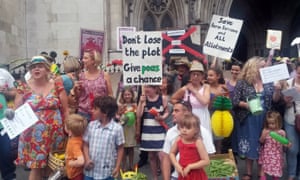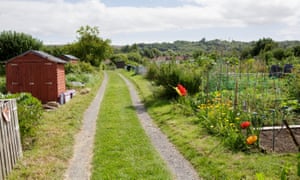In 2014, there was a protest outside the Royal Courts of Justice. The protesters were colourful: with flowery dresses, a bee costume and balloons. They had clever signs such as: “Give Peas a Chance” and “Don’t Lose the Plot”. The protest was described as a “turf war” by newspaper headline writers, because they love a pun, and because it was about allotments. Last Friday, the protesters were back, this time with wheelbarrows, pumpkins and produce, because once again Watford council had applied to close Farm Terrace allotments, and once again some of the people of Watford refused and fought back.
On paper, Watford council’s rationale for closing Farm Terrace may sound reasonable, even though the plots have been there since 1896 and have statutory protection. The council wants to build a “health campus”, an Orwellian-sounding scheme that incorporates a new hospital, green spaces and that dreaded phrase beloved of planners, a “community hub”. Watford’s elected mayor, Dorothy Thornhill, interviewed the last time the turf war got to court, said that it would bring “up to 1,300 new jobs, much-needed homes, green open spaces which can be enjoyed by all and community facilities, including a community hub with shops”. She also said Farm Terrace plots were “a really hideous, derelict site”.

It’s difficult to object to a new hospital or 1,300 new jobs. But anything that uses the expression “green spaces” raises my hackles, because it means that the rest of the project is hard spaces and concrete. The council’s “master plan” is actually unclear: even the hospital doesn’t know what it will use the site for yet (Sara Jane Trebar, a Farm Terrace campaigner, thinks it will become 68 houses and a car park for Watford football club). But if it were to be built without allotments, as the mayor’s comments imply, it would be an own goal. Gardening, as a Social Care Institute for Excellence review of evidence showed in 2013, reaps “a range of benefits across emotional, social, vocational, physical and spiritual domains”. Allotments are as good for the people of Watford as that community hub with shops (which Watford presumably already has plenty of).

I support the Farm Terrace fighters because I’d fight for my plot, even though I’m a haphazard gardener. Slugs have eaten more this year than I’ve managed to grow. But when I’ve struggled with depression, when even getting out of the house seemed like the hardest thing in the world, I still sometimes walked five minutes to my plot, past the neat and flourishing allotments that shame me; past the scruffy ones that comfort me, to my higgledy-piggledy plot with its rose bed, sturdy greenhouse and pathetic tomato plants, my glorious collard greens and magnificent roses.
Five minutes there, kneeling to weed, putting my hands into soil, and my spirits lift. There are other riches there too: the businessman who arrives stressed and leaves less so; the young families who leave with children clutching sweetcorn or potatoes, now knowing that not all fruit and vegetables come wrapped in plastic; the old boys who offer advice, wanted or unwanted. Growing your own isn’t always cheaper, but it’s always better. It is one of the best counter-balances that remains to our cult of lonely, commerce-driven individualism.
In law, allotments are apparently well protected, from the 1908 Small Holdings and Allotments Act that instructed councils to supply allotments to meet demand, to further strengthened legislation in 1925. Allotments on statutory land, such as Farm Terrace, can’t be disposed of without ministerial consent. But pressure groups such as Save All Allotments and Don’t Lose the Plot think the Localism Act of 2011 and recent 2014 guidelines that supposedly simplified the law only made it simpler for plot land to be turned into building sites. In a freedom of information request, Save All Allotments found that between 2007 and 2014, 194 of 198 applications to close allotments were granted by the secretary of state. The National Allotment Society is more sanguine, pointing out that of the 65 of 87 applications for disposal that were granted between 2010 and 2013, most were for small bits of land for access or flood alleviation, or land that had long been disused.
But Farm Terrace isn’t disused, nor derelict, nor hideous. The case matters because it is a fight about what is of value. Of course hospitals and houses are needed. The problem with Farm Terrace is that Watford council can’t see the worth of the plots, nor that a proper health scheme can be more than a community hub, shops and a bit of green space. The judicial review adjourned on Friday with no decision reached, but my grubby allotmenting fingers are crossed that peas will be given a chance. I hope that there is room, still, in our era of cat-calling, spite and profound uncertainty, for the simple, humble act that is putting your fingers into the earth, and reaping what you sow.
Our precious allotments are being destroyed – it’s time to get our hands dirty | Rose George
Hiç yorum yok:
Yorum Gönder